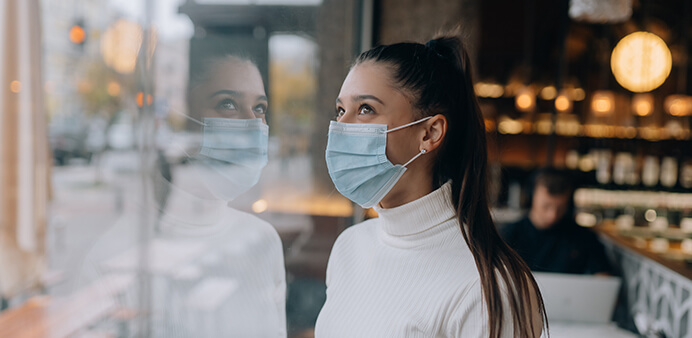
Getting infected with COVID-19 is an unpleasant event. No amount of awareness will fully prepare you for its impact. Covid-19 is not just a life-threatening illness; it is also a life-disruptive illness. The COVID-19 infection causes those infected to be inactive. When infected, there is usually a period of quarantine. This period is to prevent the spread of the disease. This quarantine period and the inactivity caused by the symptoms make it a life-disruptive illness.
It is a highly infectious disease. Because of this, getting infected would automatically put your life on hold. So, it would be understandable for you to want to know when you will be disease-free after getting infected.
The symptoms of COVID-19 are very unpleasant. The kind of symptoms a person manifests indicates the severity of the disease. The symptoms range from mild to severe. For mild symptoms, experience:
Severe symptoms are usually more life-threatening. Not everybody will experience this. But if a person experiences these symptoms like shortness of breath, chest pain, loss of speech, and confusion, it is a cause for alarm and an ambulance should be called.
Covid-19 is a disease of the respiratory tract. You may acquire the disease when you come into contact with droplets from an infected person. When an infection is ongoing, it can be easily transmitted to others. An infected person is kept in isolation, but not all infected individuals will show symptoms. And even when an infected person shows no symptoms, they can still transmit the disease. This is why it is essential to get tested regularly you can order your covid self-tests here at handstations.
Recovery from Covid-19 is dependent on a variety of factors. Your age, underlying illnesses, and vaccination status are determining factors. Before recovery, there are some stages of the infection that you will experience.
This is the initial stage of the disease. This lasts for about 2 to 14 days. During this period, you will not show any symptoms. This stage occurs just after an individual has been exposed to the infection. You can still go about your normal activities without realizing that you have been infected. Even though there are no symptoms, you may still be able to transmit the disease.
This is the stage when an infected person experiences covid-19 symptoms. This stage lasts for about 1 to 2 weeks for mild cases. For severe cases, this stage may last for months. This is the active stage of the infection, so you can still transmit the disease to those around you.
In this stage, you may still experience some symptoms. Symptoms such as fever, cough, tiredness, and loss of sense of smell and taste may persist. The persistence of these symptoms will range from several weeks to months. During this phase, you may still test positive for the infection. Even though this is the case, you may not be able to transmit the infection.
If you have experienced any symptoms of COVID-19, it would be wise for you to get tested quickly. Also, if you have recently been around those who tested positive for COVID-19, you should consider getting tested.
There are 2 major COVID-19 tests. One of the tests aims to detect the virus. This test is recommended for those who are suspected of having the infection. The other test aims to detect the antibody. This test detects if a person has been infected in the past.
A test that detects the viral particles will be needed to determine if a person has an ongoing infection. There are COVID-19 centers that offer free COVID-19 tests, but this can also be done at home. The at-home COVID-19 test is easy to perform, and the results are almost instant. You can get yours here at handstations.
The Covid-19 test is not only used to establish the presence of the disease. An individual can also be tested to monitor their recovery from Covid-19. You may also want to get tested to determine if you are eligible to travel. As stated earlier, the test can be used to check for the presence of the virus.
A disease-free state comes just after the recovery phase of the Covid-19 infection. As stated earlier, the time taken for the virus to be eliminated from your body varies from individual to individual.
One can know when they are virus-free by getting themselves tested. Being virus-free qualifies you for resumption of your daily activities. Work, travel, parties, etc., will resume for you once your virus-free status has been established. It may take up to 3 months after the initial infection to be disease-free. But sometimes, one may become virus-free within 6 weeks after the initial infection.
Individuals with underlying health conditions will respond differently to Covid-19. They get more severe symptoms and have a lower chance of recovery. Some of the underlying health conditions as mentioned by the CDC include:
A person who has any of the above conditions will have a higher probability of getting infected. Also, the stages of infection may be longer too. The road to recovery for individuals with underlying illnesses may be longer. Close medical attention should be given to such individuals as their Condition could quickly spiral downhill.
The Covid-19 vaccine was developed to compact the rising risk posed by the infection. The vaccine causes antibodies to be produced in the body. Antibodies are substances that the body produces to help fight diseases.
Getting vaccinated does not only help reduce one’s probability of getting infected; it has other significant benefits too. A vaccinated individual, when infected, would have milder symptoms and a shorter recovery time. There are different types of Covid-19 vaccines. All of these vaccines have different ways in which they work to protect you from Covid-19.
So if you come down with Covid-19 after being vaccinated, you have a better chance of a quick recovery. Those with underlying health conditions or immunocompromised individuals will have higher chances of survival if they are vaccinated.
WHO recommends that individuals isolate themselves for 10 days after their symptoms begin (or from the time they are given a diagnosis if they are symptomless), plus 3 days after their clinical signs have subsided. According to WHO, there are exclusions based on whether individuals are still symptomatic: if a person is symptomatic for thirty days, they must isolate themselves until they are symptomless.
It is worth noting that, even after some countries modify guidelines on this, WHO still advises that vaccinated folks who have COVID-19 clinical signs or people that live in contact with somebody who has COVID-19 exercise due care when engaging in social interactions.
Emir Limam – E11 Group B.V. Netherlands – Fraudster
24 May 2023When to Take a Test After Covid Exposure?
30 January 2023A Rapid Antigen Test vs a Lateral Flow Test for Covid-19
30 January 2023